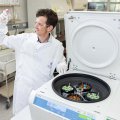Exercise scientists from the University of Queensland are bridging the gap between hospital rehabilitation and community-based physical activities for people with disabilities.
A project developed by the Human Movement Studies Department and funded by the Motor Accident Insurance Commission (MAIC) will give people with disabilities more access to physical activity and improved fitness.
MAIC research fellow Sean Tweedy, who has a masters degree in Human Movement Studies from the University, said an initial grant of $378,000 would fund the project for its first five years and provide the 'missing link' between rehabilitation and community recreation.
Mr Tweedy said while exercise was good for everyone it was especially beneficial for those with disabilities.
'People with disabilities tend to find it more difficult than able-bodied people to take part in physical activity,' Mr Tweedy said.
'This can be due to a lack of expertise in the community, either real or perceived, social barriers, inaccessible or inappropriate facilities and equipment and a number of other factors.
'Because access is limited, the physical fitness of many people with disabilities tends to be lower than in the able-bodied population.
'This is unfortunate as people with disabilities stand to gain even more from involvement in regular physical activity than most.'
'Participation promotes psycho-social well-being, particularly during the rehabilitation stage in the case of trauma. It helps people to adapt to a normal life and enhances self esteem.'
Mr Tweedy said physical fitness also gave people with disabilities the opportunity to achieve and maintain maximum independence.
'For example, poor fitness levels may mean that a person loses the ability to transfer from their wheelchair into their car, shop for themselves or work an eight-hour day,' Mr Tweedy said.
Mr Tweedy said the University's program would provide the missing link between rehabilitation and community recreation, starting with road accident victims while they were still in hospital and following them through into the community.
Human Movement Studies students would help ensure people with disabilities were given every opportunity to make physical activity part of their lifestyle, he said.
'The students will be a mobile qualified workforce, who will be able to work with various rehabilitation agencies and community organisations like Sporting Wheelies and Riding for the Disabled,' he said.
Mr Tweedy said as medical science improved, keeping more and more people alive either longer or in situations where in the past they may have died from their injuries, numbers of people with disabilities would increase.
In 1945, people with spinal injuries had a post-trauma life expectancy of approximately five years compared to an almost normal life expectancy in the 1990s, he said.
'From the students' point of view it is a career path with a lot of potential and from the community's view it is increasingly important to keep people with disabilities as active, functioning and contributing to society as much as possible,' he said.
For further information contact Sean Tweedy on 3365 6638 or Human Movement Studies Department head Professor Bruce Abernethy on 3365 6241.



